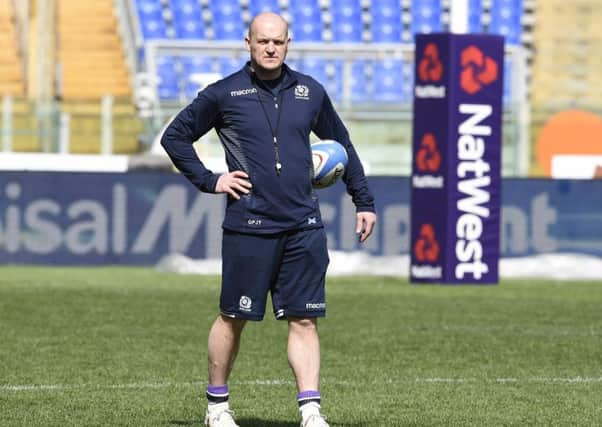Allan Massie: Scotland have a secure defence, Italy don't


We go to Italy in reasonable expectation of victory. Failure to win would make a mockery of the quality of rugby we have played at Murrayfield, and indeed even in Dublin. Gregor Townsend has made five changes in the starting XV, and these indicate how much this Scotland squad now looks like a club. By that I mean that nobody is surprised if Glasgow or Edinburgh, or indeed Leinster or Munster, change a third of the starting side from one week to the next; it doesn’t mean that players are dropped – in the usual sense of that word. Likewise with the difference between Scotland in Dublin and Scotland today.
Italy in Rome have always been a tough proposition for us, and may well be so again today. They’ve had a curious season. They have, of course, lost all four matches, but they have scored nine tries in them, and this is two more than we have scored, even though everyone has, quite rightly, been praising the enterprise and attacking elan of this Scotland team. The downside for Italy is that they have conceded 23 tries, eight to Ireland, seven to England, five to Wales and three to France. So, while they have had very good periods of play in every match, they have suffered from defensive frailty. Townsend is known as an attacking coach, but he has always insisted that success must be built on a secure defence, and Italy don’t have that.
Advertisement
Hide AdAdvertisement
Hide AdIn this context, one might remark that the regular insistence by much of the London media that French rugby is in a parlous state, and Jacques Brunel’s France are a very poor team, looks cock-eyed.
France have conceded only five tries in four matches, none to Ireland, two to Scotland, two to Italy and one to England. At least this year France have been hard to beat.
Most eyes today will be on Twickenham. Even those of us who said a couple of months ago that Ireland might be the best team in the tournament are probably a bit surprised to see them already champions before what so many had expected to be a Grand Slam decider.
So what has happened to England? A simple answer might be that they were never quite as good as they were thought to be, and would always find winning at Murrayfield and the Stade de France hard. Some may say they look over-coached, with players reluctant – or unable? – to play what is in front of them. Others, considering their last two matches, might disagree and say that in Edinburgh and Paris they looked as if they hadn’t been coached at all.
Still, Twickenham is different. Warren Gatland has opined that England will win, partly because he knows how hard it is to beat them there, partly, he says, because they know they have to. Well, that state of mind may produce results but may also however provoke mistakes. To the onlooker there’s no obvious plan to Eddie Jones’s reshuffle, though it would be stupid to start talking about deck-chairs on the Titanic. All the same, Jones’s own reputation as a miracle worker has lost a bit of shine. Lose today and there will be questions about the RFU’s decision to extend his contract beyond next year’s World Cup.
Ireland are the best team in the championship at retaining possession; it was a big surprise when a forward knocked on a simple pass last week. England, on the contrary, have been squandering possession with knock-ons and sloppy passing. With Richard Wigglesworth at scrum-half instead of Danny Care, we can expect England’s box-kicking to be better than it has been, but then it’s a question of the chase. It is easier to spot weaknesses in England than in Ireland, and if the game was in Dublin, Ireland would be short-priced favourites. As it is this will be the first Six Nations match at Twickenham for three years which seems a 50/50 game.
It’s quite possible of course that this will be the day that redresses the hone/away balance, for one can make a case for three away victories today. Scotland should win in Rome if they play at anything like their best – even though the match may be very close for the first hour. France will at least surely be as hard to beat in Cardiff as they have been in every match in the tournament, and Ireland have the chance not only to make history by winning what would be only their third Grand Slam but, remarkably, to do so in what is unusual circumstances. They are already champions, the Grand Slam is a bonus, and the pressure is more severely on England than on the visitors.